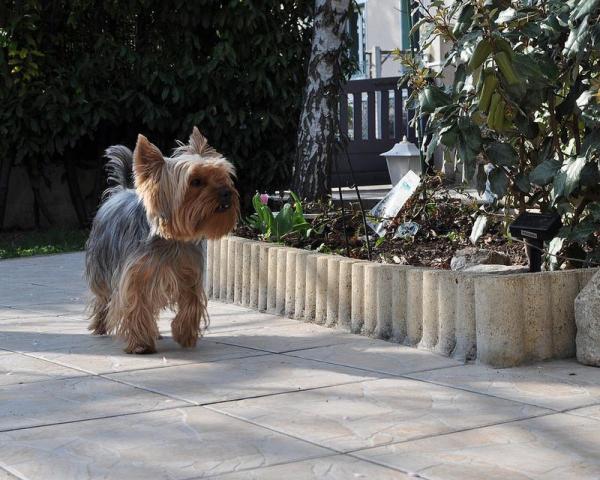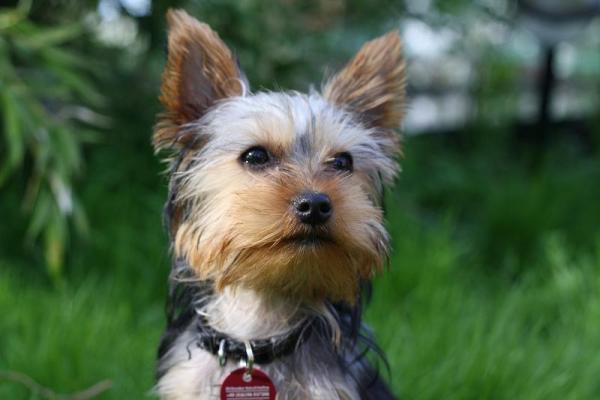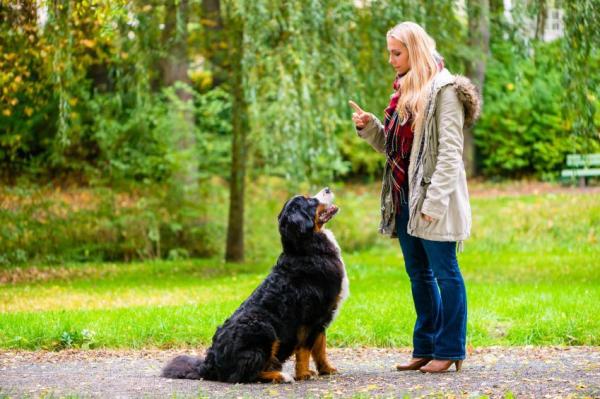How to Train an Aggressive Yorkie - Tips & Tricks



See files for Dogs
The Yorkshire terrier is a small dog that is easily trained, it is not usually an aggressive dog. However, if they have received a bad education in the first months of life or have suffered a traumatic experience, they can become an aggressive dog that is difficult to treat.
If you have noticed a change of character lately, aggressive behavior with other dogs or towards you, it is very important to start a process of education as soon as possible in order to avoid the problem from escalating, as it will be more impossible to treat.
In this AnimalWised article you will discover how to train an aggressive Yorkie and the steps that you must follow to achieve stability in your daily routine. Start enjoying a serene and stable relationship with your Yorkshire Terrier from this moment onward!
Causes of aggressiveness in dogs
Usually when we see a dog bark, growl or bite at any person or animal we say it is "an aggressive dog". However, they are very different situations that have their particular meaning and that can be triggered by very particular and different reasons.
During the early stages of a dog's life it is imperative to practice socialization. It is a process in which our dog learns to relate to people, other dogs and objects around them. When you carry out positive contacts repeatedly, our dog understands how to act and develop in each daily situations that surround them.
However, despite having received good socialization, some dogs are begin to show "aggressive" behavior. The causes can be very diverse:
- Fear
- Traumas
- Anxiety
- Stress
- Bad socialization
- Health problems
- Sexuality
- Etc.
It is also important to take the Yorkshire Terrier's past into account: this breed was used as a hunter dog to kill and drive away rats from the miners' houses centuries ago. Although it may not seem like it, rats can be very aggressive, which is why we can detect very brave behaviors in a Yorkshire Terrier, as these are traits that still remain in their character.
Finally, we'd like to add that the education we provide is another factor that can influence sudden aggressive behavior in a Yorkshire Terrier. An excess of over-protection or giving in to your dog's desires constantly are the most common reasons.

Agressive yorkie puppy
If your Yorkshire Terrier puppy is starting to show aggressive behavior lately, you should take action to prevent this situation from getting worse. Although most dogs are re-educated, the truth is that a change of behavior in the puppy is more likely to succeed than in an adult. However, do not worry if your Yorkshire Terrier is an adult, if we work properly we can redirect their behavior.
Read on to find out what is the problem that affects your Yorkshire Terrier and discover some basic tips that can help:
Yorkie aggressive with other dogs
Despite its small size, the Yorkshire Terrier is a curious and very brave dog. To properly deal with the problem you must be very observant and analyze what behavior problem your dog suffers:
- Stress and anxiety: Life in a kennel or the breach of any of the five freedoms of animal welfare can make your Yorkshire feel insecure, stressed and very anxious. In these conditions a dog can not be trained nor can it properly relate to other dogs. You must promote a quiet, stable and happy environment for at least 30 days before even thinking about their re-education.
- Fear: If your dog has suffered a negative experience with another dog, it is likely to bark or be aggressive out of fear. In these cases it will be imperative never to force our Yorkshire Terrier to interact if they do not want to, we must give them space to start to interact. You can propitiate this situation by meeting with very sociable dogs and walking together at a reasonable distance to avoid conflict.
- Lack of socialization: As we have mentioned, socialization is fundamental so that dogs can relate well with others. If your dog does not know that they should stop playing when the other growls or how the natural hierarchy within a pack is, conflicts and problems are likely to arise.
- Sexuality: Some dogs may have "dominant" behaviors with others if they are not sterilized. In addition to many other benefits (including a lower risk of the onset of certain diseases), sterilization of pets will allow us to enjoy games between same-sex specimens once the adaptation is complete.
- Reactivity: Not all dogs that react with other barking dogs are aggressive and intend to "attack". In fact, some of them are totally happy and sociable when presented properly. A "reactive" dog is one that reacts to the presence of others by habit as it has been repeating this behavior over and over again.

Yorkshire Terrier aggressive towards people
This is a much more complicated problem to deal with and solve. Note that a Yorkshire Terrier does not have excessive strength and is not capable of doing much harm to humans, but an aggressive attitude toward us is very harmful and worrying, especially if there are children involved. We will pay special attention to some cases:
- Protection of resources: The dog growls or bites when we approach their food, their toys or their bed. It is very important not to punish or scorn your dog if they are showing this behavior as it can make this situation much worse. We must practice obedience with them a lot as well as offering them food directly from our hand so that they understand that it is we who offer them the resources that they have.
- Fear: Negative experiences your dog has had with people can make them become aggressive with either acquaintances or strangers. It is a very serious problem that must be treated properly in order to slowly make them feel confident and comfortable.
- Defense against ill-treatment: If you have physically scorned your dog and they have bitten you, you must know that your behavior is totally reprihensible. You should not hit your dog, ever.
- Dogs trained for attack: Many dogs that have been trained to defend and attack by inexperienced people can develop very negative behaviors that are difficult to treat. Although this is an unusual case among Yorkies, it can happen.
- Redirected Attack: Sometimes your dog may be barking energetically at another and suddenly they bites you! That happens spontaneously because the dog is tremendously affected and anxious and has bitten your leg because it was there. Avoid these situations.

Steps to treat aggressiveness
To begin with you should be able to identify what causes your dog's aggressiveness and what the problem that your dog actually suffers is. Here we have mentioned some of them but there are many more. To know how to identify this situation properly we must go to an ethologist or a canine educator, which are specialists in animal behavior. Only they are able to offer you a diagnosis and guidelines for you to work with your pet.
However, while you wait to contact a professional, you can start to treat the problems that your dog suffers in general by following these basic tips:
- Quiet and stable environment: It is basic to start to prepare your grounds. Your dog should be part of a relaxed and quiet family so that they can respond and be calm too. Remember that dogs learn from their families.
- Avoid scorning: A dog with severe anxiety or stress problems should not be scorned in any case. You must always promote the desired behavior from positive reinforcement.
- Practice dog obedience: Sessions between 10 and 15 minutes long each day will be enough for your dog to become accustomed to receiving orders and complying with them. Do not forget the prizes, treats and caresses whenever they do well. You must assume a very positive and calm attitude so that the dog can be happy. These habits will help you maintain your safety and fulfill the following goals.
- Avoid stressful situations: If your dog suffers serious stress problems it will be essential to avoid situations in which they may feel violent. Walk your dog early in the morning or late at night if you are in the city so you can enjoy the walk.
- Suitable walks: You must walk with your dog for at least 90 minutes daily divided between two and three full walks. You should also analyze some common mistakes when walking your dog and avoid them.

If you want to read similar articles to How to Train an Aggressive Yorkie - Tips & Tricks, we recommend you visit our Behavioral problems category.






 My dad lived with us when we first got our yorkie. He went back home for 6 weeks and when he returned the yorkie growls at him and barks. She won’t come near him. I cannot figure out why.
My dad lived with us when we first got our yorkie. He went back home for 6 weeks and when he returned the yorkie growls at him and barks. She won’t come near him. I cannot figure out why.




